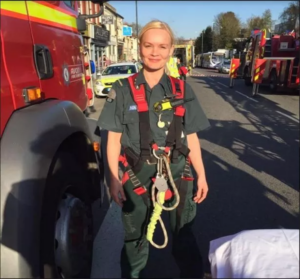Blog – Navigating the tides: My Journey as an NHS England Allied Health Professions Clinical Fellow in Mental Health
As an NHS England Allied Health Professions (AHP) Clinical Fellow specialising in mental health, my journey has been both challenging and rewarding.
In this reflective article, I share my experiences, the leadership skills I have acquired, and how adversity transformed into opportunity.
Author: Sasha Johnston, Senior Mental Health Lead, Research Paramedic, and NIHR Doctoral Research Fellow (DPhil)
Leadership skills gained
Scoping and idea generation
In this role, I had the opportunity of scoping for innovative ideas to explore how we can reduce the unwarranted variation in mental health care provided by the AHP workforce. This involved collaborating with multidisciplinary teams, engaging stakeholders, and identifying gaps in mental health education and services. By actively listening and fostering creativity, I learned to generate impactful solutions.
Project oversight and funding
Overseeing projects from conception to implementation was a pivotal aspect of my Fellowship. I navigated the complexities of securing funding, ensuring alignment with organisational goals, and managing resources effectively. These experiences honed my project management and negotiation skills.
Project planning and communication
Developing and presenting project plans required clarity, persuasion, and strategic thinking. I learned to communicate complex ideas succinctly, tailoring my messages to diverse audiences. Crafting compelling narratives became second nature.
The unexpected halt: A flare-up of inflammatory bowel disease
Life took an unexpected turn when I faced a serious flare-up of Inflammatory Bowel Disease (IBD). The recommended treatment, discomfort, fatigue, and uncertainty forced me to make a difficult choice to stop working and take a break from the Fellowship. In the end I was off work for four months. As someone deeply committed to my profession, this decision weighed heavily on me.
The psychological impact of not working
The workquake
Bruce Feiler’s concept of a “workquake” resonated with me. Just as earthquakes disrupt the ground beneath us, my sudden absence from work shook my professional identity. The urge to check emails persisted, and guilt gnawed at me. I grappled with the fear of being forgotten.
Collaborative resilience
Instead of succumbing to despair and anxiety, I chose resilience. I collaborated with my IBD Hospital team, my ever-supportive University Professor, and my NHS England mentor. Together, we embarked on a unique project: exploring the psychological underpinnings of anniversary reactions in IBD patients. Our hypotheses delved into the emotional impact of disease milestones and the intersect between gastroenterology, psychology, and immunology.
Transforming challenges into positive experiences
By channelling my leadership skills, we crafted a journal article that challenged existing paradigms. The process was cathartic—it reminded me that adversity can be a catalyst for growth. Our findings shed light on the emotional complexities of living with chronic illness. This approach was also utilised throughout my project work by using the appreciative flip to transform any negatives into positives.
Conclusion: Turning tides
As I return to work, I carry these positive experiences with me. Challenges, when met head-on, can transform into stepping stones. Having spent most of my career working as an emergency ambulance Paramedic, I realised that a lot of the skills needed for the Fellowship, such as communication, adaptability, empathy, and problem-solving, were skills that I practiced every day in my frontline role.
The biggest challenge for me has been pre-planning my day and using journaling to record my activity. This is essential for project management, but after spending 20 years in a reactive emergency role, this was a new challenge that I am getting better at. My journey as an AHP Clinical Fellow has taught me that resilience, collaboration, and adaptability are essential. The waves may be turbulent, but they also carry us toward new horizons. By embracing both the calm and the storm we can continue to make a difference in mental health and beyond.
To find out more about how NHS England Allied Health Professionals Fellowships work please email england.ahpwte.sw@nhs.net.

